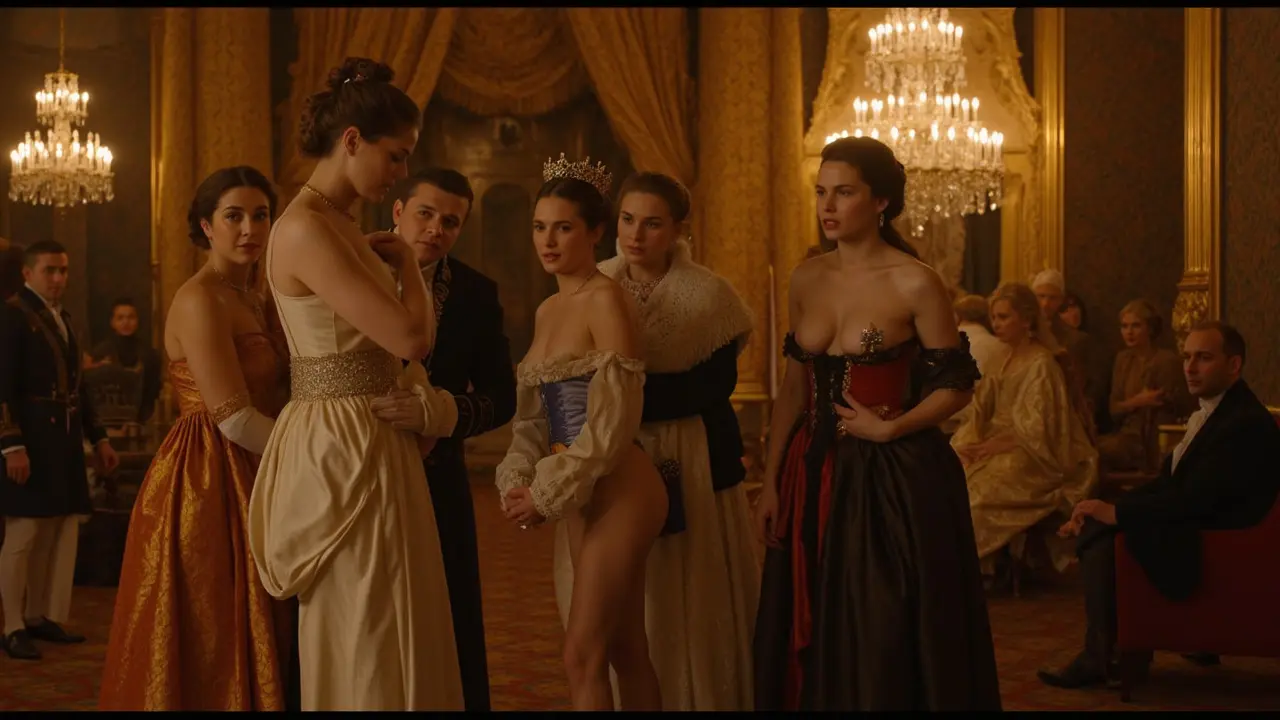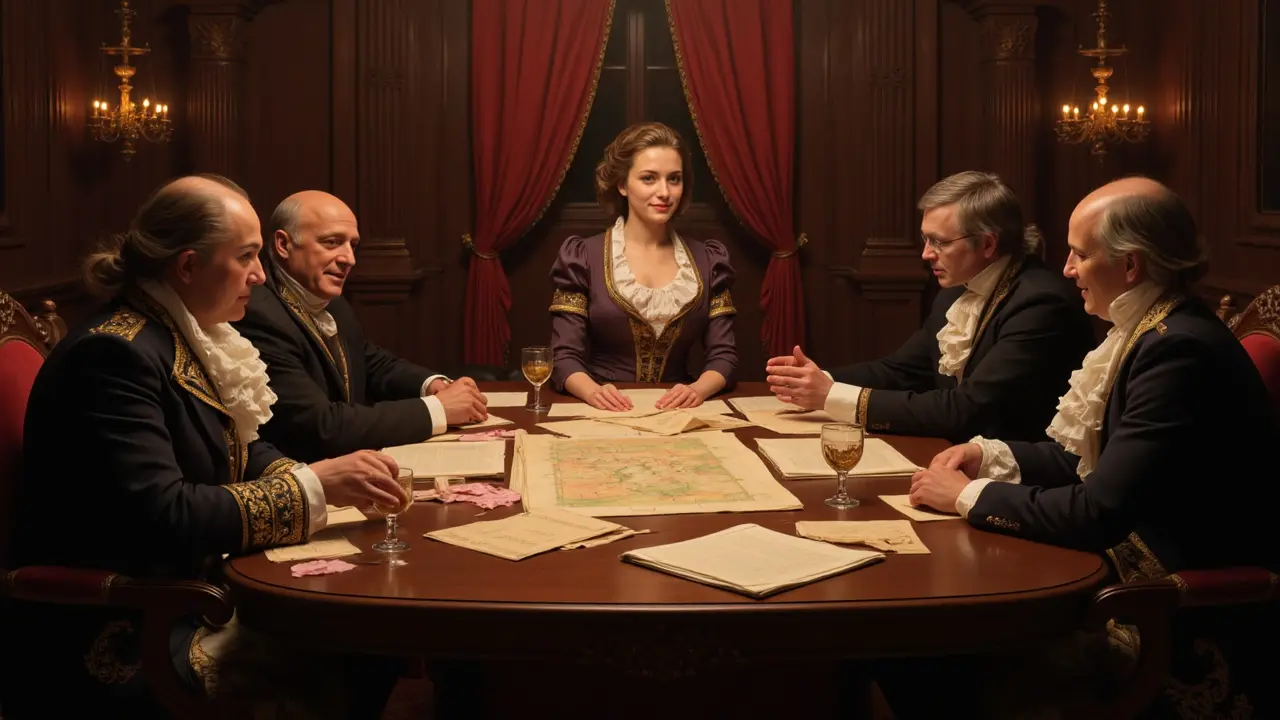
Ever thought a whisper in the right ear could shake up a kingdom? Courtesans did it all the time. These women weren’t just about parties or pretty looks—many were experts in conversation, quick thinkers, and masters at reading people. They had access to rulers, secrets, and big decisions, often working from the shadows to nudge the direction of powerful courts.
If you picture political strategy as a game of chess, courtesans were the surprise pieces. Royalty trusted them, shared worries after midnight, and sometimes made major decisions based on these private talks. Forget the boring textbook stuff—real power sometimes looked like silk dresses and subtle smiles, not armor or crowns.
- The Secret Influence of Courtesans
- Courtesans and Power: Real Stories
- Modern Parallels to Historical Courtesans
- Spotting Political Intrigue Today
The Secret Influence of Courtesans
Courtesans at royal courts often held more sway than the public realized. Even in societies where women had few formal rights, these women found workarounds by building close personal bonds with rulers and nobles. Some of the most famous players behind major decisions weren’t kings or prime ministers—they were courtesans with access to confidential gossip and political plans. Ninon de l’Enclos, a well-known French courtesan, was rumored to have influenced more than just matters of the heart, using her connections to quietly push for political improvements in the 1600s.
The Venetian courtesan Veronica Franco wrote poetry and exchanged letters with powerful men, sometimes shaping how they approached politics and alliances. What gave them this pull? They were often better educated than the average woman of their day and, surprisingly, sometimes even more than male courtiers. Their ability to listen, empathize, and offer advice made them trusted confidants. One historian put it simply:
"Courtesans acted as unofficial advisers—what was said in private often determined what happened in public." —Linda Simon, author of Lost Girls: The Invention of the Flapper
Courtesans weren’t just onlookers either. In Tsarist Russia, Catherine Dolgorukova became the secret wife of Tsar Alexander II and was a driving force in his push for reforms. These women could pass along information, help smooth tensions, and sometimes even sway peace talks. Secret influence meant sometimes playing messenger between rival leaders, or exposing a plot before it hit the streets. At the end of the day, their skills in reading a room could change the fate of a nation.
What’s really interesting is how discreet they had to be. If things went public, their work was over. Staying in the background let them do more than any official adviser sometimes could. That’s the real legacy behind the term courtesan in the world of political intrigue—hidden power, often underestimated by those looking for it in all the wrong places.
Courtesans and Power: Real Stories
Some of the wildest political shakeups started with a so-called “entertainer” who knew her way around the court better than the politicians. Take France’s Madame de Pompadour, for example. She was King Louis XV’s top adviser for nearly 20 years, not just his favorite at court. She helped pick ministers, guided alliances, and influenced public art and culture—all because the king actually trusted her advice and smarts over his own political veterans. Her role shows that courtesans had real say in royal moves, not just empty titles.
Then there’s Mata Hari. You’ve probably heard her name—she started out as a famous dancer and courtesan, but during World War I, she became tangled up in spy games. She was accused of passing military secrets between France and Germany. Whether she was a real double agent or just stuck in a messy political situation is up for debate, but her story proves courtesans often had dangerous access to secrets. The line between pillow talk and political intrigue could get razor-thin.
Look at ancient China for another wild example. Yang Guifei, one of the "Four Beauties of Ancient China," became the emperor’s closest confidante. Her opinions influenced the Tang Dynasty’s top policies and key appointments. She even played mediator when powerful officials clashed. But when fortunes turned, her influence made her the target; rebels blamed her for court problems, showing how risky these positions could be.
Here’s what ties these stories together:
- Court favorites weren’t just there for show—they often picked up sensitive tasks or guided important talks.
- Access to private chats with rulers meant they heard secrets long before the rest of the court.
- Jealous rivals and political enemies always watched for ways to use a courtesan’s influence against her.
So when people talk about who really ran things, courtesans were often right behind the scenes, steering the action. The courtesan isn’t just a story character—she’s a key part of how real history was made.

Modern Parallels to Historical Courtesans
It’s easy to think political whisperers are something from the past, but today’s world still needs fixers and connectors. Swap royal beds for private jets and press briefings, and you’ll spot similar patterns. The big difference now? The tools have changed—social media, press coverage, and digital networks have joined the game.
Look at how power gets shaped in modern capitals. You’ll find lobbyists, political consultants, and high-profile influencers playing roles that echo what courtesans did in old courts. It’s about trust, insider knowledge, and building alliances. For example, famous figures like Monica Lewinsky or Carla Bruni—who mixed personal relationships with public politics—sometimes had outsized impacts on national discussions, just like their historical counterparts.
Even celebrities or “socialites” hold court now at parties and fundraisers where politicians and business magnates mix. Backroom deals and policy ideas often surface at these gatherings, not just in official boardrooms or parliaments. For instance, the Met Gala isn’t just about fashion; it’s where deals and connections happen over dinner—much like historic salons run by influential courtesans.
You’ll also find data showing the ongoing importance of private advisors and informal networks:
| Role | Historic Example | Modern Parallel |
|---|---|---|
| Courtesan | Ninon de l’Enclos (French Salons) | Influencers/Socialites (e.g. Kim Kardashian) |
| Power Broker | Madame de Pompadour | Political Advisors (e.g. Valerie Jarrett) |
| Gatekeeper | Countess de Castiglione | LGBTQ Ballroom Icons as Community Connectors |
If you want to spot these modern "nodes of influence," pay attention to who’s shaping conversations—sometimes they’re not elected or even in official jobs, but they steer outcomes through networks and trust, just like the classic courtesan did in the shadows of history.
Spotting Political Intrigue Today
Now, you might be wondering—does the influence of courtesans have anything to do with what's going on right now? Actually, yes. The methods might have changed, but the idea of quietly steering important decisions hasn’t disappeared. Just look how government advisors, lobbyists, or public figures operate behind the scenes. Sometimes, you won’t even notice their moves until something big happens and you start to connect the dots.
If you want to spot political intrigue today, it helps to keep an eye out for a few obvious signs. For instance, pay attention to sudden shifts in public policy or unexpected changes in top leadership. These often have roots in conversations you’ll never see on camera. Networking, private dinners, leaks to the press—these are the modern versions of what a skilled courtesan could pull off centuries ago.
- Watch for alliances that seem unusual or out of nowhere. Sometimes, a quick friendship between public figures means someone is pulling strings out of sight.
- Track who shows up at private events or closed-door meetings. These guest lists often reveal the real power players.
- Listen to what insiders say in interviews or offhand remarks. Sometimes a slip can show you there’s more going on than officials admit.
- Check who controls the flow of information. The person spreading news or rumors often has more influence than you’d think.
Want hard proof that intrigue is still everywhere? Here’s a table—just check out these examples from the past few years where shadowy influence changed the game:
| Year | Event | Behind-the-Scenes Influence |
|---|---|---|
| 2022 | Resignation of UK Prime Minister Boris Johnson | Confidential talks and internal party negotiations swayed public support |
| 2024 | US TikTok Ban Legislation | Lobbying by tech companies and foreign diplomats shifted the debate |
| 2023 | Paris Olympics Security Contracts | Private backdoor deals shaped how billions were spent |
The lesson? Whether in royal courts or city halls, influence isn’t always obvious. If you’re curious, start watching for these signals and you’ll spot political intrigue happening around you every day—even if no one calls it that anymore.
